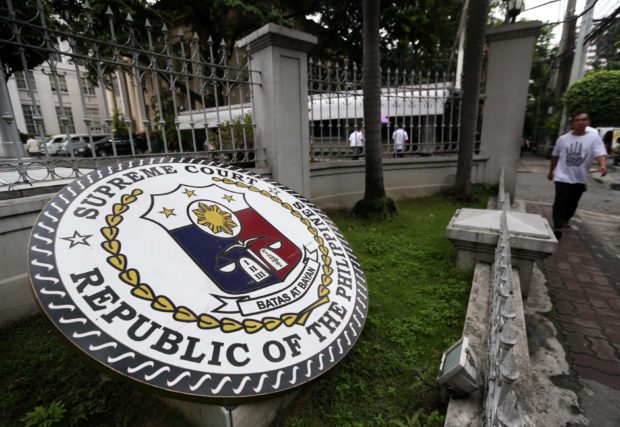SC affirms prison term for husband found guilty of extramarital affair

The Supreme Court symbol in Manila. (File photo LYN RILLON / Philippine Daily Inquirer)
MANILA, Philippines — Infidelity or having extramarital affair is considered “psychological violence,” the Supreme Court said in a decision that affirmed the prison sentence of up to eight years against a husband found guilty of having an affair and fathering three children with his mistress.
“The prosecution has established beyond reasonable doubt that [the husband] committed the crime of psychological violence, through his acts of marital infidelity, which caused mental or emotional suffering on the part of AAA [the wife],” the Supreme Court’s first division said.
The decision which was written by Chief Justice Diosdado Peralta affirmed a minimum of six months to a maximum of eight-year prison term against the husband for Section 5(i) of the Anti-Violence Against Women and Children (VAWC) Act.
Section 5 of the VAWC enumerated what are considered acts of violence against women and children. Specifically, section 5 (i) refers to acts “causing mental or emotional anguish, public ridicule or humiliation to the woman or her child, including, but not limited to, repeated verbal and emotional abuse, and denial of financial support or custody of minor children of access to the woman’s child/children.”
The husband is also ordered to pay a P100,000 fine and P25,000 as moral damages. He is also required to undergo mandatory psychological counseling or psychiatric treatment to address his abusive behavior.
Article continues after this advertisementThe couple got married in 1989. In September 2007, the wife learned that her husband was having an extramarital affair and that he fathered three children with his mistress. She filed a complaint against her husband and the mistress. The complaint was settled with the husband agreeing never to see the mistress again.
Article continues after this advertisementTwo months later, however, he left his wife. With help coming from the National Bureau of Investigation, she learned that her husband returned to his mistress.
On trial, the husband admitted that he left his wife because he can no longer take her behavior. He also admitted that he is aware of the sufferings because of his infidelity.
The wife said what happened to her marriage took a toll on her health as she was often hospitalized, took anti-depressant medicines and sleeping pills.
“Marital infidelity, which is a form of psychological violence, is the proximate cause of AAA’s emotional anguish and mental suffering, to the point that even her health condition was adversely affected,” the high court said.
The Las Piñas Regional Trial Court found the husband guilty of psychological abuse in a decision dated Oct. 30, 2017. Then, on Dec. 17, 2018, the Court of Appeals affirmed the lower court’s ruling.
The husband took the case to the Supreme Court but the high court denied the petition for the failure of the petitioner “to show any reversible error” in the Court of Appeals ruling.